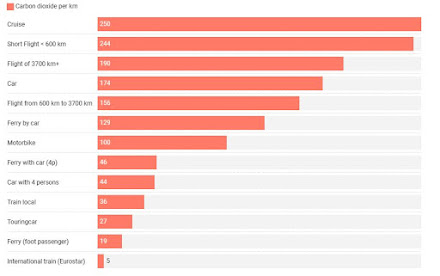My partner and I had come up with this brilliant idea of taking a cruise vacation. It seemed to tick a lot of boxes... affordable, easy travel out of Vancouver, see new places, all inclusive and easy for partner who has trouble on long-haul flights. What's not to love!
Just pop over to Vancouver, board a cruise ship and see the world! Enjoy the delicious food, check out the entertainment and soak up some sun around the pool. No flight. No airports. Just kick back and relax.
Sounds dreamy, yes?
Well... no.
I discovered, much to my chagrin, that cruise ships are essentially massive carbon producing monsters. They have these massive engines that run 24/7, even when the ship is in port. These engines use heavy fuel oil, a tar-like substance which is incredibly toxic and a residual of the petroleum industry. Basically it's the crud nobody else wants and is incredibly dirty.
Even though a new cruise ship costs $1,000,000,000 (that's a billion)... they can't afford to spend a piddly $1,000,000 (that's a million) to install emission abatement systems.
They've done tests on cruise ships and the emissions that the passengers breathe are 20 times worse than the pollution on a main road... in Beijing.
Soooo... what is the carbon footprint of a cruise ship? Well... brace yourself. They produce the same particulate emissions as 1,000,000 (a million) cars. Every. Single. Day.
Some cruise ships emit up to 150 tonnes of carbon. Every. Single. Day.
And no... even though the cruise ship companies claim they are clean & green... it's not true. At least not for the majority of them. Check out the Cruise Ship Report card by Friends of the Earth.
Oh... and if that's not enough... some cruise ship companies have been caught dumping dumping trash, raw sewage, and fuel into the ocean. Looking at your Carnival and Royal Caribbean.
 |
| Cruise Ship Rankings for Environmental Protection Measures by NABU |
My head is hurting. I did find a carbon footprint calculator for a cruise and... for a 5 day cruise with 2 days in port... it was 1.5 tonnes of CO2 per person. That's a lot of carbon... for 5 days. Our little car uses emits just under 5 tonnes of CO2 per year.
And then that got me thinking... what about our ferries??? They run off of diesel... I think. Well... ferries generally aren't as bad, mostly because of the short distances... and they're not dumping sewage and stuff into the ocean... And they are waaaaayyyy better than short haul flight! Here's a breakdown of CO2 emissions per km.
In case you're squinting... top of the list is Cruise, then short haul flights (less than 600 km), then flights more than 3700 km, car, flight (600-3700 km), ferry by car, motorbike, Ferry with car (4p), Car with 4 people, Train local, Touring car, Ferry (foot passenger), International Eurostar Train.Hydrogen fuel seems to be the wave of the future... maybe. Although, right now... hydrogen fuel cells in a cruise ship are used for in-port power and slow steaming. Other than that, they're still running off petroleum sludge.
I'm hoping that there will be some major progress by 2030 but... in the meantime... should we avoid cruise ships? I'm not here to say yay or nay. But if we do take a cruise... don't bring disposable garbage onboard, turn off your lights when you leave the cabin and limit the amount of grey water you produce (short or less frequent showers).On a happier note... the Vancouver cruise ship terminal does have shore power so cruise ships can plug in and turn off their diesel power. That's 50 less tonnes of CO2 emissions per port call. Yay. Small steps...
More Reading
CBC - As it Happens - Cruise Ship Emissions are the Same as 1 Million Cars
Popular Science - Care about the Planet? Skip the Cruise, for Now.
Friends of the Earth - Cruise Ships' Environmental Impact
Friends of the Earth - Cruise Ship Report Card
My Climate - Carbon Footprint Calculator for a Cruise Ship
NABU - German Research Group - 2022 Cruise Ship Rankings
BC Ferries - Clean Futures Plan 2022
Ferry GoGo - Ferry Emissions - is UK site but probably ballpark for our ferries




No comments:
Post a Comment